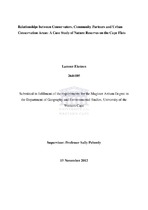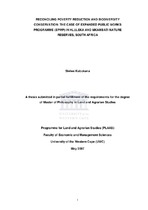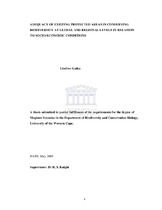Relationships between conservators, community partners and urban conservation areas: a case study of nature reserves on the Cape flats
Abstract
Cape Town is a unique city. It has a global biodiversity hotspot, in the midst of an urban area. Historically, nature conservation practice excluded and marginalized certain groups of people based on their race and class. This has led to peoples‘ disconnection from nature. Rapid biodiversity loss is a major concern for conservators. In the last three decades, there has been a paradigm shift in conservation practice in certain parts of the world. The Cape Flats Nature programme based in Cape Town followed suit and aimed to stimulate a bottom-up participatory approach to conservation and replace the traditional top-down management strategy. The programme was tasked to reconcile the challenges of complex and conflicting relationships between urban poverty, unequal access to resources and biodiversity conservation. This study was aimed at investigating the relationships between conservation management, community partners and urban conservation areas. These relationships are vital for the progression of new conservation practice in places where people live and work. In addition, the transformative aspects of conservation in relation to social inclusion and the shift in conservation approaches was investigated. The study was conducted at five of Cape Town‘s nature reserves, Edith Stephens Wetland Park, Macassar Dunes, Harmony Flats, Wolfgat and Witzands Aquifer Nature Reserves. Data collection included in depth interviews with key informants from various conservation organizations, the Cape Flats Nature Programme team, the managers of the selected reserves and community partners. Others included observational methods and analysis of secondary data. It was found that relationships between conservators and local communities are not easily created and maintained but relationships regardless of its depth are equally beneficial to communities and the conservators. Balancing social needs with conservation needs is a struggle for conservators but many successes came in cases where this balance was realized. In addition, the transformation of conservators‘ identity has changed community perceptions of conservation practice holistically. Although, many informants feel that transformation continues to remain unequal.
Related items
Showing items related by title, author, creator and subject.
-
Relationships between conservators, community partners and urban conservation areas: a case study of nature reserves on the Cape Flats
Eksteen, Lameez (University of the Western Cape, 2012)Cape Town is a unique city. It has a global biodiversity hotspot, in the midst of an urban area. Historically, nature conservation practice excluded and marginalized certain groups of people based on their race and class. ... -
Reconciling poverty reduction and biodiversity conservation: The case of expanded public works progeamme (EPWP) in Hluleka and Mkambati Nature Reserves, South Africa
Kobokana, Siviwe (University of the Western Cape, 2007)This study aimed at analysing the South African government's attempt at reconciling poverty reduction and biodiversity conservation in the context of the Expanded Public Works Programme (EPWP). The study analyses this, ... -
Adequacy of existing protected areas in conserving biodiversity at global and regional levels in relation to socio-economic conditions
Gaika, Lindiwe (University of the Western Cape, 2005)At a meeting of worl leaders at the United Nations Conference on Environment and Development in Rio de Janeiro in 1992, it was recognized that because of the tremendous increase in the size of the global populations (which ...




